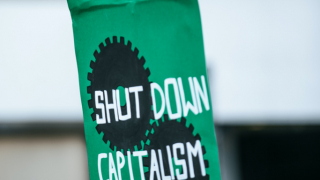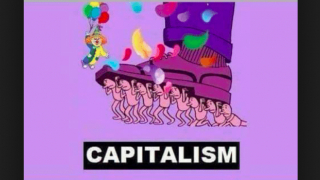Chris Poll: Small and Medium Enterprise is Beautiful
International Conference: «Financial Capitalism and its Alternatives for the 21th Century: Contributions on the 4th Economical Theory» which will be held in the capital city of Moldova, Chișinău, on 15th-16th December.
Forty-odd years ago a German economist, living in Britain, named, E.F. Schumacher, delivered a sanguine argument in his telling book: Small is Beautiful. Its equally weighty subtitle was: Economics as if People Mattered. It was ranked as among the 100 most influential bookswritten since WW II by the Times Literary Supplement.
The point of this gem of a book was to assault what is meant by progress. It asked what had gone wrong when we live in almost obscene wealth while large parts of the planet barely get by. The book was a call to arms, to understand things we all seemed to have forgotten: what is value? What are the methods being used? What actually matters in life? Should the means always justify the ends? What is work for? And, who put all these elites and economists in charge?
These are questions that reverberate back to us even more demonstrably today as we witness a near total frustration with globalization and the ever widening differentials in ‘developed’ societies as well as in developing economies.
History demonstrates that all sections of society need to participate if growth and improvements in well-being is to happen. That message should not be lost on world leaders, captains of industry, nor governments these days. Growth is much more bottom up than top down. It could be rephrased as: Small and medium sized businesses are the lifeblood of our economies - and our societies. They are the places where jobs are created; the location where economies truly prosper, and where innovations take place. In our current near robotic age we should to come to a realization that SMEs are beautiful as the place of economic action and social benefit. We must cultivate them -- as good places and places for good.
Look at some very telling statistics (GVA) gross value added: Small and medium sized businesses accounted for 99.3% of all UK private sector businesses at the start of 2016. Total employment in SMEs was 15.7 million, 60% of all private sector employment in the UK. Three times more new jobs were created by SMEs than the FTSE 100 in the last years. SMEs are important in terms of employment and, especially in smaller countries, However, they are also significant in Germany, where they account for a high percentage of GVA created.
The German Mittlestand is well known for its characteristics and world-class companies. This is also true in the US, where 30 million SMEs accounted for two thirds of net new private sector jobs in the last decades. SMEs, according to the ILO, provide more than two thirds of all jobs in Africa, Asia, and Latin America, and 80 per cent in low-income countries.
We should celebrate these engines of growth and ask how can they do even more? What we need is a new way to foster SMEs and that revolves around capital itself.
Purchase Order Financing is that new way of getting funding to these suppliers when they most need it. It has the potential to attract and boost smaller suppliers, enabling them to handle bigger contracts more reliably, creating a more resilient supply chain, lowering input costs, while helping contractors to deliver on time and on budget.
What exactly is SME Capital Finance? It is a completely new way of financing small and medium sized businesses that are supplying into large supply chains, based on the buyer’s creditworthiness but without any advanced payment by the buyer or impact on buyer’s balance sheet. It can be insured for risks.
Cash is advanced immediately to suppliers at the point when it’s most needed - when the purchase order is issued – up to 50% of the value of the purchase order.
This process involves the buyer as a critical participant, but zero cost to the buyer and with no impact on buyer’s balance sheet. The supplier pays a finance charge with no need for security or any director’s guarantee.
For the supplier this amounts to unsecured borrowing, available earlier and more flexibly than other forms of funding. It is cheaper than invoice based finance, which only is possible after the goods are delivered and services completed. Bank debt requires security and takes forever.
Such a form of capital could be made available to ‘new work’, construction and other industry suppliers providing access to finance that traditional providers of finance, such as banks, struggle to provide, especially given the lack of need for security or collateral.
Such supplier resilience reduces the risk of supplier failure, and enables smaller suppliers to take on bigger contracts than otherwise might be possible. Purchase Order Finance increases as each business grows yet does not require the borrower to pledge security. This grows small companies into medium sized ones and in the process adds many jobs and fosters economic growth.
Supply chain resilience means that not only do suppliers and buyers benefit, but also suppliers are attracted to work with buyers that take seriously the needs of their suppliers.
There is also a significant cost savings as more viable suppliers means keener competition, lower prices (potentially with big savings for buyers), and provides more incentives for suppliers to innovate.
The social benefits of this kind of collaborative approach provide a USP for contractors tendering for public sector construction projects and for companies looking for new suppliers around the globe. It would provide spending procurement budgets locally and allow for a Brexit-driven infrastructure push in the UK. In the US and across deindustrialized Europe, it would put jobs back in those places that badly need them. In the developing world it would encourage market-based development and take businesses from start up phases into the next rung on the ladder.
This kind of financing favors smaller, more local suppliers, who are often more cost-efficient but have otherwise been unable to access finance. It strengthens local communities with social and economic benefits of multiplier effect by keeping spending and employment local, efficient, and more sustainable.
This new scheme of financing would complement prompt payment codes and transparency and fits around stage payments and approvals processes, helping to reduce cash flow volatility. Time is money and this fixes that problem.
SMEs often struggle because they can’t fund growth and don’t have the financial ability to face off against giant companies. This process of greater flexibility to fund anything, including additional equipment, software, materials, manpower, or services such as training, puts them back in the game and makes them competitive. It is a lifeline.
SMEs need a sustainable way to do business collaboratively. By helping smaller and medium sized suppliers (SMEs) to compete and grow we all benefit. And we achieve what we all want: growth at a more robust and sustainable rate of development, while creating more good jobs, jobs, jobs.
***
Theodore Roosevelt Malloch is a leading business professor, strategist and policy maker who has written extensively on economic growth and good companies and is America’s designate EU Ambassador.
Chris Poll is Chairman and founder of SME Capital Finance, founder of Doing Business Together, founder, financier and Chairman of Micropal from 1983 to 1997, before its sale to Standard and Poors and jointly created UK’s USM – now Alternative Investment Market (AIM). He has been called the father of SME finance.














